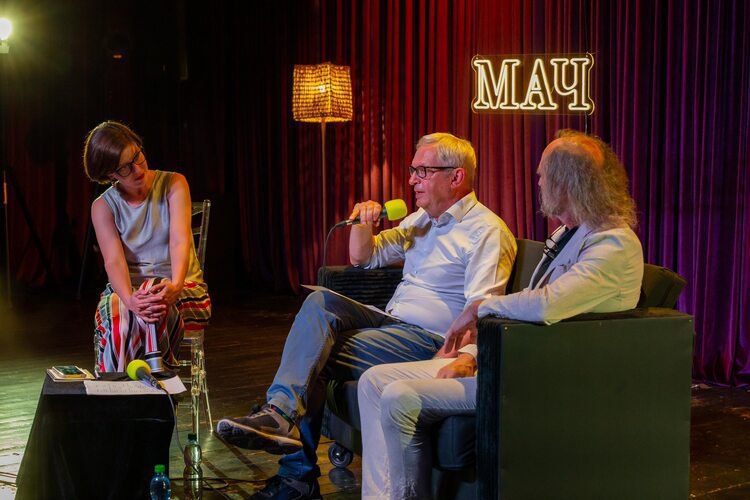
How it all began: Brno, 1999
“Debate is the foundation of parliament. Because parliament comes from the French word parle,” says contemporary Czech writer Zdeněk Papoušek. With these words, he opens the first day of literary meetings in Lviv at the tenth anniversary cross-border festival, the Authors' Reading Month.
The small, cosy courtyard of the Lesya Theatre is bustling. People are slowly filling the chamber hall. Some greet old friends; others wait intently for the event to begin. Among those present are many diplomats, well-known European writers, translators and prominent cultural figures. Yet the setting creates the feeling of a shared, homely courtyard where everyone feels at ease – a place where each time a new perspective on the culture of neighbouring countries emerges, or where an unseen connection becomes apparent. On the theatre stage, the spotlights glow steadily, leaving the illuminated human faces in focus.
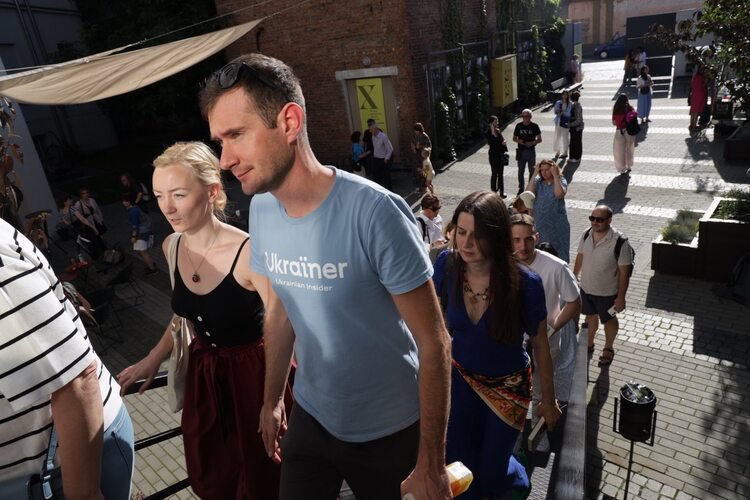
It all began in 1999, when the first literary meetings of Czech authors took place in the city of Brno, later developing into one of the largest literary festivals in Central and Eastern Europe. The driving forces at the time were Petr Minářik and Pavel Řehořík, directors of the Czech publishing house Větrné mlýny. Later, Lucie Řezníková – diplomat, former director of the Czech Centre in Kyiv and researcher of Ukrainian studies – took on the role of building literary bridges and advancing international cultural diplomacy, particularly in the context of Czech–Ukrainian relations.
Since then, the Authors' Reading Month has become a travelling festival, moving between cities and countries, bringing together diverse literary contexts, refining its structure and content, and becoming one of the key international cultural bridges of Central European literature.
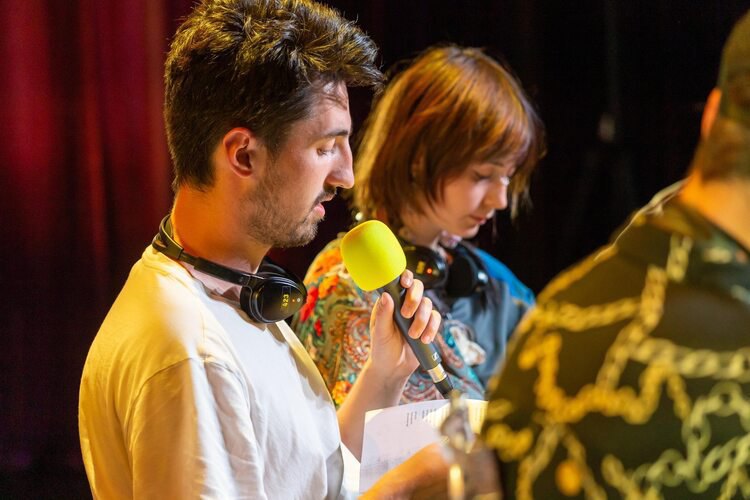
Ostrava – Wrocław – Košice – Bratislava – Trenčín – Prešov – Lviv: this is the route of the author readings. In Lviv, the ten-year history of one of Ukraine’s longest-running literary events began. In 2015, Ukraine joined the festival map, becoming a full partner and co-organiser. Since then, Lviv has hosted over 100 Ukrainian and 257 foreign writers from eight countries – Spain, Georgia, Turkey, Romania, Hungary, the Czech Republic, Slovakia and Poland.
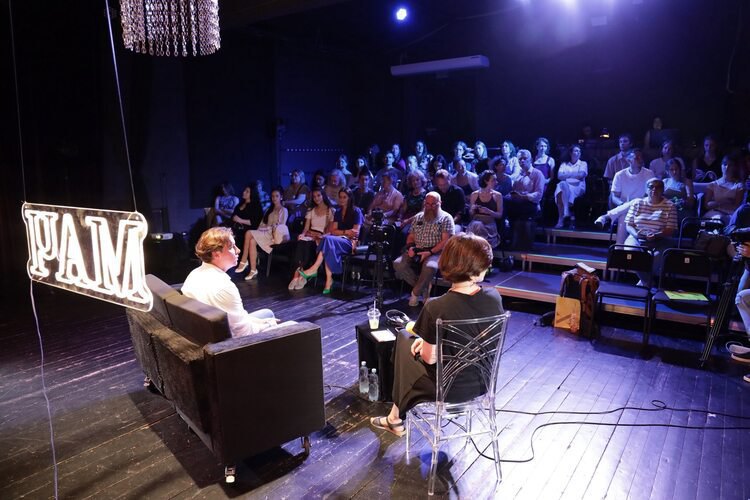
Around 50 Ukrainian authors have visited all foreign festival cities over the past decade. The festival features two strands: the honoured guest section, comprising 31 authors, and the main programme, presenting writers from the Czech Republic, Slovakia, Poland and Ukraine. Each day includes two readings in which writers present excerpts from their works. For foreign authors, a translator provides either simultaneous or consecutive translation throughout the meeting, with translated texts projected on a large screen in the hall.
Literature is long-lasting and never ceases
The philosophy of the festival lies in its consistency – it takes place every year in July, maintaining both its schedule and its original concept. It addresses themes such as the traumas of the past, dictatorial regimes and the recurring collapse of empires. It speaks of shared pain and the quiet joy of rethinking past experiences. Every metaphor resonates, offering a point of reference through words, sound and text.
The journey of the Authors' Reading Month is not only physical. Attending all 31 days of readings – without leaving the city – can transport audiences through different temporal, historical and geographical spaces, guided by the living voices of authors, while leaving room for personal imagination.
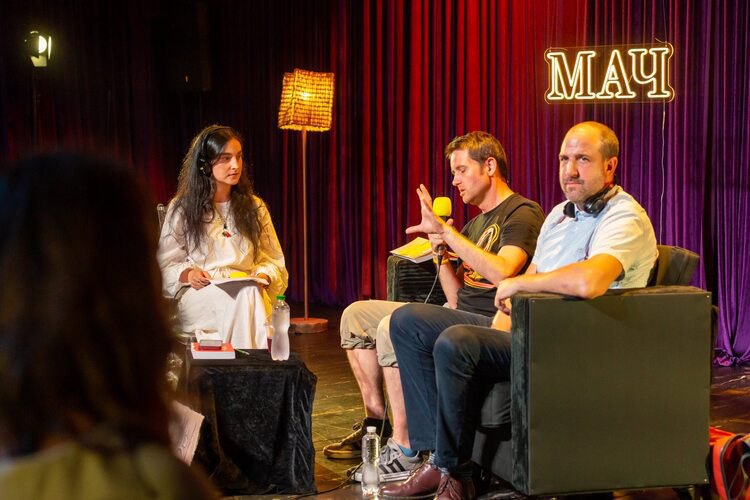
The uniqueness of the festival also lies in the fact that it is not limited to literature, although literature is at its core. Over the decade, it has changed venues three times: beginning at the iconic Dzyga, moving to the gallery hall of the Lesya Ukrainka Theatre, and finally settling on its chamber stage. Increasingly, authors are transforming their readings into live performances, with poetry merging into short theatrical scenes in which the audience becomes part of the action. The concept of hosting readings in a theatre was introduced by Czech partners, and this synchronisation of venues has become a defining feature of the event.
Another central idea for the organisers was the concept of the city landscape – choosing so-called ‘second’ cities. These are not noisy metropolises, capitals or global cultural hubs, but places where life flows at a slower pace. In 2015, Lviv became such a city.
Being ambassadors of neighbouring countries
Hryhoriy Semenchuk, founder and director of the Authors' Reading Month in Lviv, chairman of the Dialogue Art Council, writer, musician and cultural manager, states that the continuity of the event is of paramount importance to him. Over more than a decade, this literary journey has not only shaped a responsible cultural environment but has also developed a well-established mechanism of international cultural diplomacy and effective tools of influence. It has fostered a culture of literary ambassadorship, enabling participants to represent their countries through literature.
“ARM is a platform that mutually promotes the literature of different countries – the Czech Republic, Slovakia, Poland, and, of course, Ukraine. At the same time, it is a space where creative ties between nations and their literatures grow, leading not only to literary projects but also to wider cultural initiatives.”
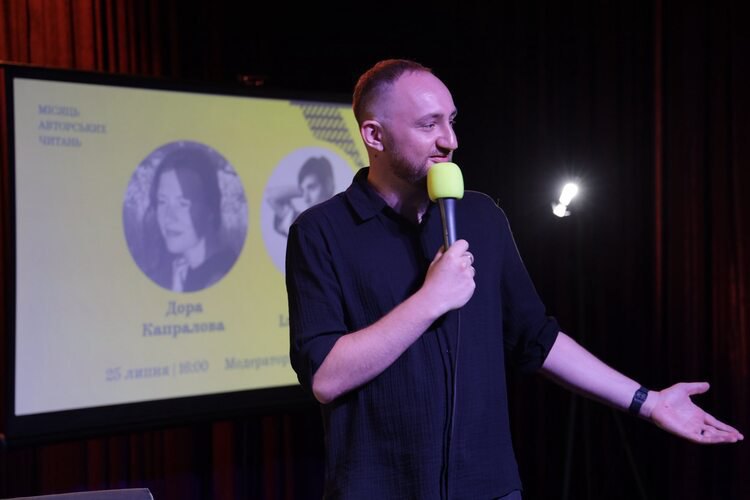
Semenchuk had known Lucie Řezníková long before the Authors' Reading Month came into being. At that time, she was translating Ukrainian literature, and when the first anthology of Ukrainian authors was published by the Czech publishing house Větrné mlýny in 2009, the idea emerged to introduce more Czech authors to Lviv. Later, Řezníková became director of the Czech Centre and, together with her colleagues – the founders of Větrné mlýny – proposed that Ukraine should become the guest of honour at the festival in the Czech Republic in 2015. At the same time, another city was added to the festival’s itinerary.
“Lviv’s infrastructure seemed most attractive to Větrné mlýny, so it was only logical that it was launched here,” says Semenchuk, adding that July was chosen deliberately. It is traditionally a time when people might be less inclined to attend literary events, being on holiday or otherwise occupied. Nevertheless, the festival’s first edition in Lviv, ten years ago, generated considerable interest. Since then, there has been a commitment to maintain the festival in its original format – 31 days, with a different guest country of honour each year.
Czech and Slovak solidarity with Ukraine
The outbreak of the full-scale Russian invasion forced ARM to pause and ultimately alter its format. In 2022, for the first time in its history, the Authors' Reading Month did not take place in Lviv. Instead, the organisers arranged a Night of Ukrainian Poetry in Brno, where nine Ukrainian poets travelled to give voice to a nation at war. The following year, the team decided the festival must continue, as it had already become a valued tradition in the city.
Although the programme was reduced from 31 days to between two and four, this did not prevent the organisers from bringing leading Czech, Slovak and Polish authors to Ukraine. One of the main reasons for continuing was the immediate willingness of Czech and Slovak writers to travel to Ukraine, witness the reality of a country under large-scale attack, and then share the truth about the war in their own nations. Since 2023, July in Lviv has once again been marked as a month of literature – shorter, but no less significant.
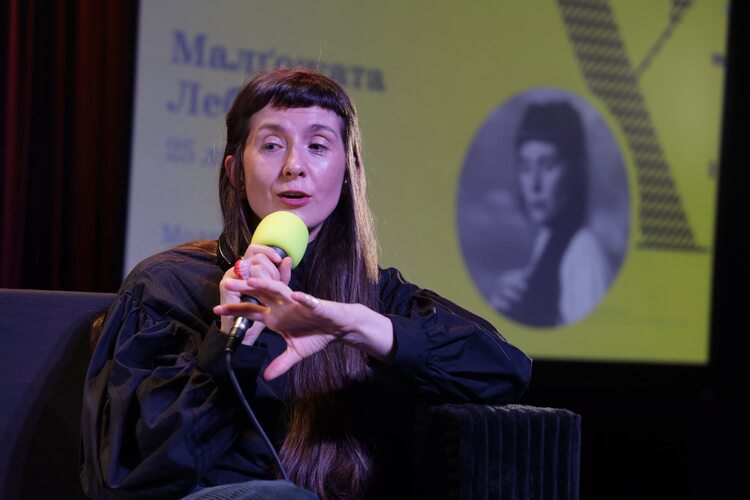
This year marked the festival’s tenth anniversary in Lviv. Its history demonstrates that literature exists beyond the limits of time, while also responding to the challenges and crises faced by societies and individuals. It reflects on tragedies and complex historical moments; it becomes a voice in times of war and a remembrance for those no longer alive.
In 2025, Ukrainian participants included Halyna Kruk, Andriy Lyubka, Svitlana Povalyayeva and Anatoliy Dnistrovyy, alongside Czech, Slovak and Polish poets, publicists and reporters.
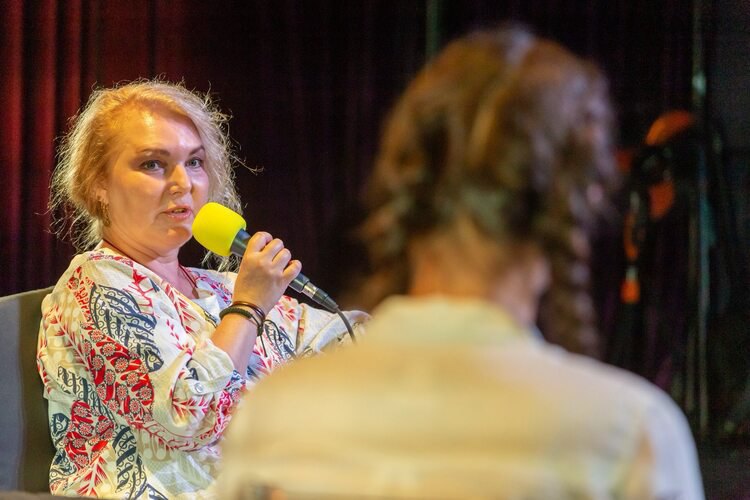
The festival encompasses a wide range of literary genres, allowing room for reflection and interpretation by both authors and audiences. Here, poetry merges with physical performance, self-reflection and essay writing, while non-fiction reportage becomes interwoven with the lives of the reporters and their subjects, creating a layered and comprehensive map of voices.
The pain of loss
For ten consecutive years, before each literary reading and the official opening of the festival, Hryhoriy Semenchuk has taken to the stage to deliver a few brief yet warmly received words of welcome. He avoids lengthy speeches; once the participants are announced, he quietly withdraws behind the theatre curtains. Occasionally, a Czech poet will call him back to the stage to share a reading, and Hryhoriy reappears as suddenly as he had departed – as if attuned to every word and moment from behind the doors of the hall. What follows is often an improvised literary slam, or more precisely, a joint performance by Czech and Ukrainian poets.
Semenchuk recalls one moment of profound pain – the first such instance in the festival’s history. In 2023, while the Authors' Reading Month was underway, Ukrainian writer Viktoriya Amelina was killed.
“It was incredibly difficult to cope with this loss. It was a very tense and heavy moment during the festival,” he says. Amelina had been a regular participant, travelling to all cities in the programme, but beyond her literary contributions, she was a cherished friend to the entire festival community.
While the Authors' Reading Month fosters mutual cultural and international ties, it also nurtures a professional network for translators of foreign literature – works that may otherwise remain little known in Ukraine.
“I once learnt that one of our translators, when Turkey was the guest of honour, later began teaching Turkish at a prestigious university. She told her students about our event. That was deeply valuable and important to me,” Semenchuk notes.
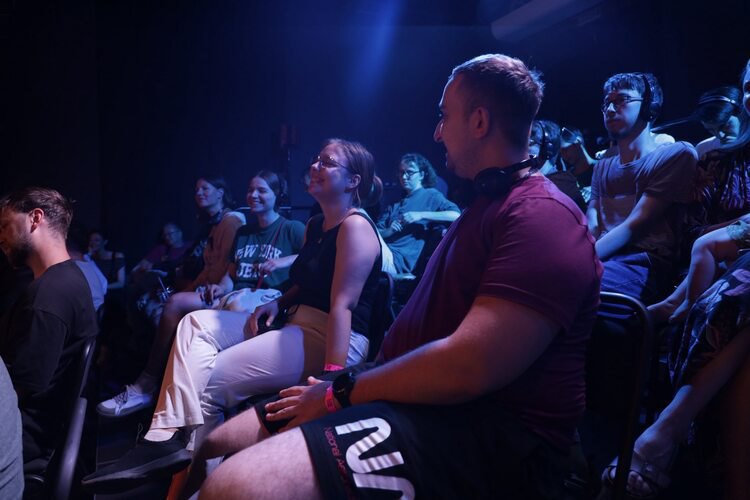
He hopes ARM will retain its character as a travelling, long-running festival, especially as Ukraine has few cultural events with a history spanning more than a decade.
“We still have much unexplored literature. We want to discover it. And we also want to gather all the translated texts from across the years and publish them as a single anthology.”
Contexts of freedom
Some participants join ARM for the first time. Among them this year was Sufian Massalema, a Czech writer of Syrian origin. Part of the Czech slam poetry scene, he belongs to a new generation of poets whose work forms a tapestry of different worlds – hills and wastelands that thicken, resist, and yet ultimately find their own quiet flow.
On the penultimate day of the festival, events outside the literary sphere converged with the programme. Young people gathered at the Taras Shevchenko monument to protest against legislation affecting the National Anti-Corruption Bureau of Ukraine (NABU) and the Specialised Anti-Corruption Prosecutor’s Office (SAP). Among the crowd were ARM participants – Czech and Slovak authors who had just concluded their readings at the Lesya Theatre – underscoring the festival’s role as a kind of public parliament, a space where social realities and the context of war are impossible to ignore.
The following day, Czech documentary filmmaker Jiří Pasz attended the final gathering of the festival carrying a cardboard sign inscribed with words: “I want to be in the EU.” From Lviv, he would travel to Kharkiv to film another documentary about the Ukrainian sky – and to write yet another story about the war.









